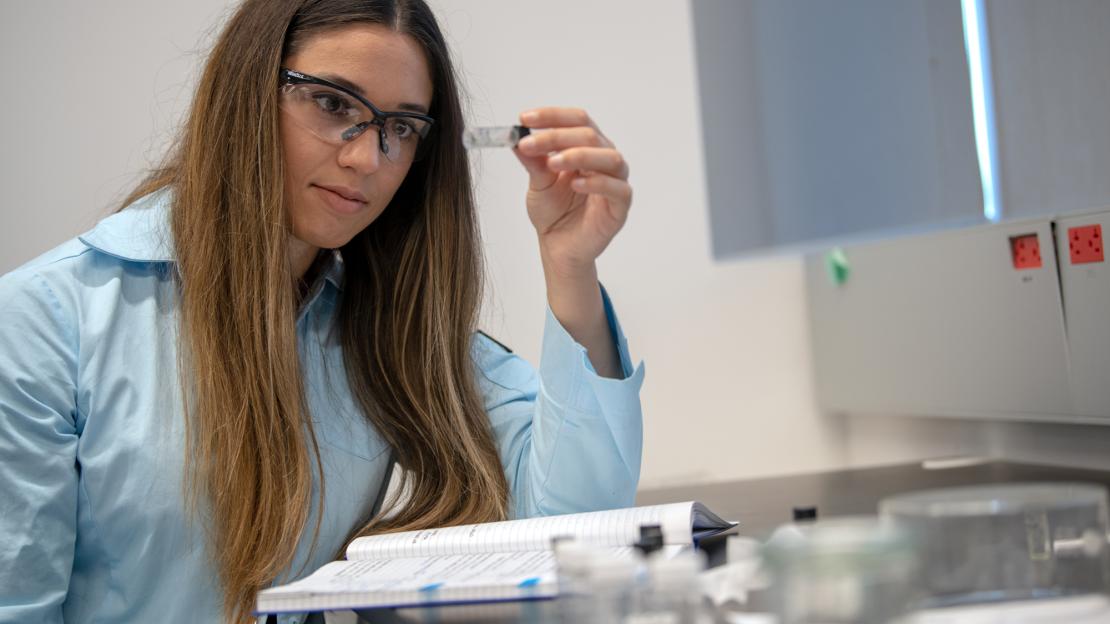In the final year of her undergraduate program, Natashya Falcone became fascinated working with gels — and their ability to heal the body.
Now, she’s hoping that fascination may lead to developing a more cost-effective and environmentally friendly way to heal damaged tissue.
Falcone, who is pursuing her PhD, works in the Kraatz Research Group where she uses amino acids and peptides (which make proteins, a crucial part of cells and muscles) to make a water-based gel, also called a hydrogel.
Hypothetically, if someone lost a piece of flesh on their arm, the gel could be injected and support the cells working to regrow that missing tissue. The gel can potentially encourage the health and growth of cells by mimicking the extracellular matrix, which binds and supports cells.
“I think this research is very interesting,” Falcone says. “I love chemical synthesis and the idea of applying it to some biological application, and how they could actually mimic something that’s in our bodies.”
Her current research is looking into whether the gel can support cell growth. She will take a line of cells and leave them in the gel. If, when she returns, the cells are still alive, then the gel can support cells. If there are more cells, the gel can support cell growth.
“If we get this hydrogel and cells can grow in it, I’ll be the happiest person ever,” Falcone says. “Getting that result means you can possibly do something good for the industry or for the world, a new method that could have an impact and make a change.”
Falcone’s project was inspired by the work of Soha Ahmadi Nadoushan, a fellow researcher in the Kraatz Research Group. Ahmadi Nadoushan is studying how tau protein aggregates with copper in the brains of those with Alzheimer’s disease and causes neurons to die. Falcone’s work probes how peptides can aggregate to form gels that may encourage cells to regrow. In each project, their research offers new insights into how general proteins accumulate — for better or worse.
Finding better ways to research
Recently, Falcone found the gel was able to self-heal. External factors like temperature or light influence whether or not the substance can remain a gel, instead of reverting to a liquid. But the gel is reversible: if it’s destroyed, it can revert into a gel.
Trapping cells in the gel may also have applications for industrial chemical production, like creating pharmaceuticals. The gel may also be able to entrap enzymes, making them more productive and stable. While similar gels exist elsewhere, they are made of chemical polymers. Falcone’s gel is non-toxic, less harmful to the body and biodegradable. It is also cheaper.
Finding cost-effective alternatives for research, health care, and chemical production is an underlying focus of Falcone’s work. She recently worked with coenzymes, which are crucial to the way the body creates energy — and very expensive. She created a mimic of these coenzymes that are cheaper and better for the environment.
Chemistry research, while important, can produce harmful, toxic chemicals that become waste. Conducting research while being environmentally friendly is another drive for Falcone, who is also in the Chemical Engineering Department at U of T.
“Chemical engineers are always looking for ways to be more efficient and proactive,” she says. “What can impact this, obviously, is cost-effective, greener technologies.”
She says she is also “inspired by nature,” that is, finding ways to imitate or enhance things the body naturally does or is supposed to do.
Getting that result means you can possibly do something good for the industry or for the world, a new method that could have an impact and make a change.
But it hasn’t always smooth experimenting. Falcone says much of her confidence was discovered in labs.
“I feel like, if you knew me in first year, you would say, ‘How is this girl getting her PhD?’ I was shy and I was timid and not confident enough in myself,” she says. “But I was always comfortable in a lab.”
Falcone has also received two awards this year, the DPES Teaching Assistant award and the Queen Elizabeth II Graduate Scholarship in Science and Technology, a provincial government scholarship.
“If somebody is confused about their future in their first year, but they really have a passion for something, I say don’t give up,” she says. “I worked hard and never quit and now I get to come to the lab every day and do something that excites me.”
